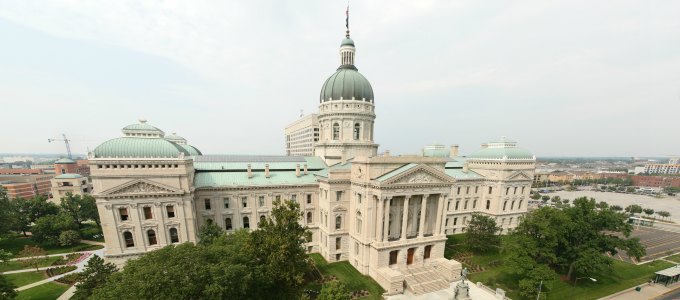Thanks to legislation passed this week, businesses in the Hoosier State can use religious freedom as a reason not to serve gay and lesbian customers. (Photo of the Indiana capitol by Daniel Schwen, courtesy Wikimedia Commons.)
Indiana Governor Mike Pence made it legal this week for businesses to turn away gay and lesbian customers in the name of “religious freedom.”
There is one big thing wrong with that statement — besides the obvious — and its one word: legal.
What’s next? Will it be legal to kill black people in the street? … OK, bad example. But you get my point, right? Making something legal means it’s okay, it’s right, it grants permission for distinctly noninclusive, not to mention not very friendly, behavior.
On the other hand, considering the extremely strong buying power of the gay community — in 2013, it was an estimated $830 billion according to Witeck Communications and MarketResearch.com — what better way to root out bigots? I’ve always believed it’s better to know up front where you stand with people. It’s easier to avoid trouble that way. Of course, that attitude isn’t effective if inclusion is the goal. But if this bill backfires, it will almost certainly be for economic reasons, not anything specifically diversity-related.
For instance, one CNN article I read highlighted the NCAA’s worry over how the new law would affect student athletes and employees in the upcoming men's basketball Final Four in Indianapolis.
NCAA President Mark Emmertsaid the organization will “work diligently” to make sure no one attending the event is “negatively impacted by this bill.” I’m not sure what that means, but he also said the NCAA, based in Indianapolis, will “closely examine the implications of this bill and how it might affect future events as well as our workforce.”
I could be wrong, but that sounds like if their profit and reputation goes south, they’ll find somewhere else to go. Others will too. According to the CNN piece “gamer convention Gen Con and the Disciples of Christ church group had threatened to pull their conventions out of Indianapolis. Tech giant Salesforce said it would halt its plans to expand in the state, too.”
Salesforce CEO Marc Benioff boldly tweeted, “Today we are canceling all programs that require our customers/employees to travel to Indiana to face discrimination.” The company’s plans to expand in the region also have been scrapped.
Indiana is the first among a dozen or so other interested states to make this law, but I suspect the furor and criticism has only just begun. It’s telling that when Pence signed the bill Thursday morning he did so in a private ceremony with Republican state legislators and conservative lobbyists. The behind closed doors nature of the whole thing smacks of wrong doing. But again, let’s not forget that oh so important word with which I began this blog — this is legal.
Pence has spun this as a “religious freedom” bill, and he maintains the controversy around it is “because of the way some in the media have reported this.” Um, no. I’m pretty sure the controversy is related to the fact that the state of Indiana has made it legal to discriminate against and refuse service to specific people and had the temerity to link that decision to any kind of freedom. Pence saying, “This is not about any contemporary issue,” is right. Bigotry has been around forever.
But if this thing backfires, it will be because of money. Specifically, people who once made it now won’t. And they won’t stand for that. In the coming years, the state of Indiana will likely be the best business case for diversity a chief diversity officer could ask for.
Even Greg Ballard, the Republican mayor of Indianapolis, is against the bill, saying in a statement on Wednesday that “Indianapolis strives to be a welcoming place that attracts businesses, conventions, visitors and residents. We are a diverse city, and I want everyone who visits and lives in Indy to feel comfortable here.” Also known as, this decision puts my city's economy at risk.
Here’s hoping this bill shot a nice, big, fat hole in Pence’s alleged plans to make a bid for president in 2016, at least. We need a decisive lawmaker in that big white house, but we don’t need someone who makes it okay to point a crusty, crooked finger at significant chunks of the populace and say, “You are not welcome here.”















